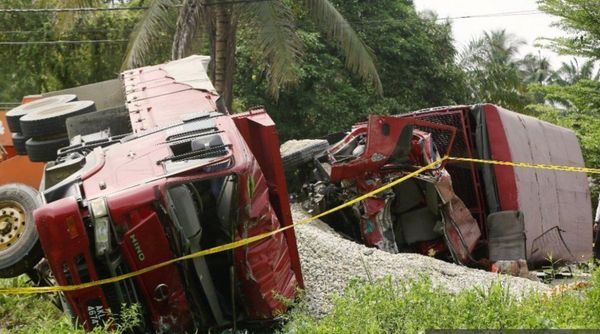By Danial Dzulkifly
SHAH ALAM, May 19 — The recent fatal incident involving a Federal Reserve Unit (FRU) truck has reignited national debate over road safety enforcement, systemic oversight, and the use of ageing government vehicles, with road safety experts urging urgent reforms to inspection protocols, corruption safeguards, and inter-agency coordination.
A key concern is the staggering number of commercial vehicles failing routine inspections, with over 1.4 million vehicles flagged in 2023 alone for issues ranging from outdated documents and worn-out tyres to faulty braking systems, according to Malaysian Institute of Road Safety Research (Miros) Professor Dr Law Teik Hua.
“For commercial cars, the Computerised Vehicle Inspection Centre (Puspakom) under the Road Transportation Department (JPJ) requires biannual inspections.
“Roughly 1.4 million vehicles failing these tests in 2023 had problems like obsolete documentation, worn-out tires, and brake system malfunctions, accounting for roughly 20.3 per cent of them,” he said when contacted by Media Selangor.
[caption id="attachment_401305" align="aligncenter" width="300"] Professor Dr Law Teik Hua. — Picture via FACEBOOK/LAW TEIK HUA[/caption]
Professor Dr Law Teik Hua. — Picture via FACEBOOK/LAW TEIK HUA[/caption]
Law said that despite commercial vehicles being subject to biannual checks, enforcement remains hampered by systemic weaknesses, including corruption, resource constraints and manipulation by vehicle owners.
“There have been instances where vehicles deemed unsafe passed inspections, prompting Puspakom to suspend staff involved in misconduct,” he said.
To counter these gaps, Law said the Transport Ministry has begun introducing a suite of new measures, including a task force on heavy truck safety, enhanced Automated Awareness Safety System (Awas) monitoring, and data-driven tools like High-Speed Weigh-in-Motion (HS-WIM) technology.
Still, he stated that Malaysia’s road safety framework must evolve from reactive to preventive by leveraging technology and improving agency coordination.
He proposed a unified real-time data platform shared between Puspakom, JPJ and Royal Malaysia Police (PDRM), alongside AI-powered enforcement, predictive profiling of high-risk vehicles, and standardised training across enforcement bodies.
No budget, no inspections
Road safety activist Shahrim Tamrin said the FRU crash has exposed not just mechanical vulnerabilities but deeper structural issues within enforcement agencies.
Citing ageing fleets as a persistent blind spot, he said many government vehicles, including those used by the police, fire department and immigration, for example, are decades old and operate without standardised inspection requirements.
“They don’t have the budget. Some of these trucks are as old as 25 to 30 years,” he said, adding that, unlike private sector vehicles, enforcement vehicles are not subject to routine Puspakom checks.
“I’m calling for a review of the SOPs and the safety features of each safety truck. In developed countries like the UK, Austria, and Germany, there are strict rules for harnesses or seat belts for all personnel riding in enforcement trucks. Malaysia needs to adopt the same, said Shahrim, who is a former Miros board member.
He stressed that his call is not to ban trucks used by enforcement bodies, but to ensure safety features are reviewed and maintained.
“I’m just saying that I’m calling for safety culture to be inculcated in the police force. It’s necessary.”
One click saves lives
Professor Dr Kulanthayan KC Mani, head of Putra Injury Prevention and Safety Promotion at Universiti Putra Malaysia, said crash prevention and injury mitigation must be addressed in tandem, especially when involving heavy goods vehicles.
“The probability of a crash happening is high when the travel speed is high. If we want to reduce crashes, one possible way is to reduce the speed of the vehicle,” he said.
Kulanthayan stated that heavy vehicles take longer to stop, require more space, and often operate in rural and non-paved road conditions, making them inherently riskier.
“A heavy goods vehicle by itself is a risky vehicle compared to any other vehicle because of the load factor,” he said.
He also warned about the severe consequences of travelling unrestrained, describing three phases of potentially fatal injuries: passengers crashing into one another, being flung into the vehicle frame, and internal organ trauma caused by high-speed deceleration.
“To survive a crash while being unrestrained is very rare. There is a very slim chance. The rule is to keep the speed low and make sure we are restrained.”
[caption id="attachment_401309" align="aligncenter" width="300"] Professor Dr Kulanthayan KC Mani. — Picture via CHILD INJURY PREVENTION ALLIANCE[/caption]
Professor Dr Kulanthayan KC Mani. — Picture via CHILD INJURY PREVENTION ALLIANCE[/caption]
Kulanthayan added that companies must take greater responsibility for vehicle upkeep, especially as these vehicles are heavily utilised.
“This type of vehicle … needs periodic maintenance. The heavy goods vehicle company must make sure its vehicles are safe at all times.”
On May 13, nine FRU personnel were killed and nine others injured after their truck collided with a sand lorry at the Jalan Chikus–Sungai Lampam junction, while returning to their base in Sungai Senam, Teluk Intan, Perak.
The incident had even earned a rebuke from the Selangor Royal household, with Sultan Sharafuddin Idris Shah Alhaj urging tougher action against those responsible for fatal or injurious road crashes.
In a recent statement issued through the Selangor Royal Office, His Royal Highness said that beyond fines or imprisonment, the licences of drivers and company owners should be revoked if they are found guilty.
The Sultan and Tengku Permaisuri Norashikin also extended condolences to the families of the nine FRU personnel killed in the Teluk Intan crash.
“His Royal Highness hopes and prays such tragic crashes will no longer occur, especially those involving the loss of innocent lives, particularly those working to maintain peace in the nation,” the post read.




